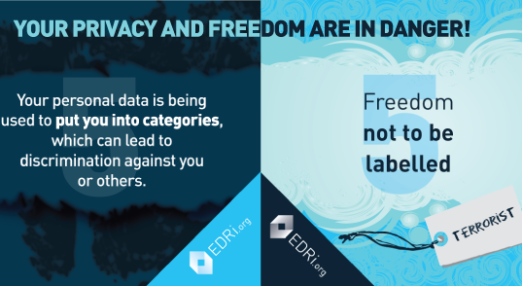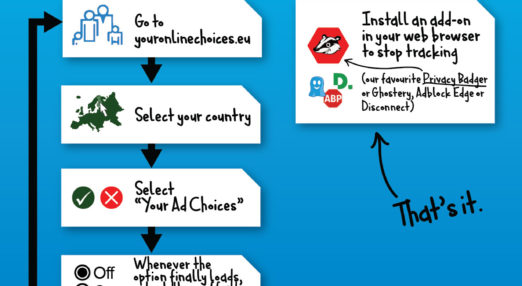profiling
Filter by...
-

What does your browsing history say about you?
An average internet user visits dozens of websites and hundreds of web pages every day, most of which are kept in the history of our internet browsers. But what if someone took this massive database of visited web pages and cross-referenced them? A joint collaboration of Tactical Tech and SHARE Lab researchers focused on discovering […]
Read more
-

#5 Freedom not to be labelled: How to fight profiling
This is the fifth blogpost of our series dedicated to privacy, security and freedoms. In the next weeks, we will explain how your freedoms are under threat, and what you can do to fight back.
Read more
-

#4 Freedom not to be manipulated: How to fight weapons of math destruction*
This is the fourth blogpost of our series dedicated to privacy, security and freedoms. In the next weeks, we will explain how your freedoms are under threat, and what you can do to fight back.
Read more
-

#1 Freedom to be different: How to defend yourself against tracking
Lee este artículo en español This is the first blogpost of our series dedicated to privacy, security and freedoms. In the next weeks, we will explain how your freedoms are under threat, and what you can do to fight back.
Read more
-

Press Release: Vote on Data Protection and Passenger Name Record package
The European Parliament looks set to adopt two proposals on data protection and a proposal on the profiling of air passengers (PNR, Passenger Name Records) tomorrow, 14 April. The two data protection proposals seek to protect our fundamental right to privacy. The General Data Protection Regulation (GDPR) covers the protection of personal data across all […]
Read more
-

ENDitorial: PNR – political finger-pointing, no viable legislation
The EU Passenger Name Record Directive (or ‘PNR Directive’) would require the storage of travel data for airline passengers, ostensibly for law enforcement purposes. The specialist European Parliament committee responsible for the proposal rejected it in 2013 but adopted the proposal in 2015, following the terrorist attacks. The European Parliament recently decided not to schedule […]
Read more
-

Transparent consumers – a report by Bits of Freedom
Data brokers follow everything you do. What you buy, where you live, what you like and what this information says about you. They sell profiles based on this information to other companies. Starting last summer, Bits of Freedom conducted research with Dutch online newspaper De Correspondent as part of the ‘Quantified society’ programme. We looked […]
Read more
-

FAQ: Passenger Name Records (PNR)
The European Union will adopt soon a Directive on the long-term storage and use of “Passenger Name Records” (PNR) for the purpose of profiling individuals as possible serious criminals or terrorists.
Read more
-

Emotion tracking company gets funding from the European Commission
Realeyes is a London based start-up company that tracks people’s facial reactions through webcams and smartphones in order to analyse their emotions. The analysed data is used to help companies maximise the impact of their advertising and market research campaigns. The technology allows the companies to know how consumers feel when they view the video […]
Read more
-

How to deal with Facebook’s new tracking policies
If you use Facebook, you may have noticed that they have unilaterally changed the rules again about how they use your data. According to The Independent, the new change allows Facebook to gather data from activity across the internet, as well as the normal data it gathers on information you and your friends have added […]
Read more
-

Googling your brain: latest “data protection” proposals from Council
When the European Commission proposed its Data Protection Directive in 1995, it made the decision not to give the EU Member States the option to opt out of its profiling (“automated decision-making”) provisions. Even in the days before “big data” and rampant mass surveillance, the dangers of using personal data to make decisions based on […]
Read more
-
Google modifies ToS: “automated systems analyse your content”
In an update to its Gmail Terms of Service, Google has clarified that all users inbound and outbound email is scanned by automated software. Addressing the decision, a Google spokesperson said “We want our policies to be simple and easy for users to understand. These changes will give people even greater clarity and are based […]
Read more
